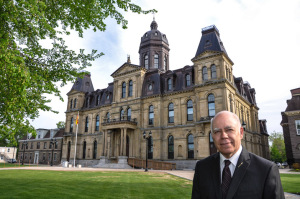Paid blood plasma clinic for Moncton facing opposition – Telegraph Journal, 13 June 2016
article by John Chilibeck, Telegraph Journal
“Before our provincial government makes any decision around this, there needs to be a robust discussion and debate about the ethics of doing this. To open the door to turn parts of people into products is quite worrisome.” – David Coon
Opposition is mounting to a private company’s plans to pay people for their blood plasma in Moncton.
Both opposition parties say they’re disturbed to hear the Liberal government is considering giving Canadian Plasma Resources taxpayer-backed payroll rebates if it sets up a $4-million clinic next year.
The Telegraph-Journal broke the story last week when Health Minister Victor Boudreau confirmed he had met with company officials and Opportunities New Brunswick was working out a deal, despite paid plasma gathering being banned in Quebec and Ontario.
Tory Opposition Leader Bruce Fitch says at the very least, there should be public scrutiny of the issue.
“If the legislature were open, we could ask the government’s position on this and we could have a debate. But the legislature is closed and we can’t ask those questions. We have to wait till the 28th of June because the Liberals shut down debate early, which is unfortunate.”
Fitch questioned the wisdom of giving companies taxpayer-backed subsidies to set up in the province. He pointed to the medical marijuana firm OrganiGram, which secured nearly $1 million in payroll rebates. The deal announced in April stipulates the company must create 113 jobs over three years, paying at least $40,000 for each position.
Earlier this month, the firm announced another windfall – this time from publicly offered shares.
“This private company was given a million bucks, a huge incentive, and then they went out on the public market and raised $10 million. Did they, as a virtual monopoly in this market, need that incentive to grow? If they can raise private investment money on their own, why do they need government money?”
Fitch said he wasn’t personally opposed to private plasma sales, joking that he could use the $25 the firm said it would offer people who roll up their sleeves and consent to being poked with a needle, up to once a week.
However, his caucus hasn’t had a full discussion about the issue and the Progressive Conservative party has not staked out a position yet.
Canadian Plasma Resources tried to set up in Toronto and Hamilton two years ago, but the Ontario government quickly banned the practice of paid plasma gathering. Earlier this year, the company opened a clinic in Saskatoon with the blessing of Saskatchewan’s provincial government.
Green party Leader David Coon said the company’s foray into New Brunswick raised important ethical questions.
“This doesn’t sit well with me, the idea of commodifying any part of people, their organs or fluids. It’s quite repugnant.”
He said in Canada, governments don’t allow the sale of organs, human tissue, sperm, eggs or whole blood, and questioned why it would be any different for plasma, the pale yellow liquid part of blood that transports nutrients, hormones and proteins to the parts of the body that need it.
The substance is sent to private labs in the United States and then sold back to Canada in the form of pharmaceuticals. Those drugs are destined for people suffering from immune disorders, burns and other ailments.
Canadian Blood Services, which draws blood from voluntary donors, has a plan to increase the amount of plasma it collects, but won’t comment on potential competition from Canadian Plasma Resources.
“Before our provincial government makes any decision around this, there needs to be a robust discussion and debate about the ethics of doing this,” Coon said. “The impacts on the whole practice of voluntary blood donations need to be discussed. Volunteers are the cornerstone of our blood donations, egg and sperm donations, tissue donations, what have you. It’s meant for the greater good. To open the door to turn parts of people into products is quite worrisome.”
The company says it follows the same health regulations and safety protocols that Canadian Blood Services does. Once it’s cleared all the regulatory hurdles in six to nine months, it plans to open a Moncton clinic that will eventually employ 40 professionals.
The Liberal government created the standing committee on social policy early in its term. Coon said it would seem like a good place for the politicians to debate the topic and hear from expert witnesses, company officials and the like, but so far it’s never met.
Boudreau, the health minister, said he supported the company coming to Moncton because Canada isn’t self-sufficient in voluntary plasma gathering and still depends on pharmaceuticals from the United States, where people are paid for their plasma.
He also said the paid practice is just as safe as voluntary plasma donations, a position that is shared by Canadian Blood Services, the Canadian Hemophilia Society, the Canadian Organization for Rare Disorders and immunodeficiency organizations.
Opponents to Canadian Plasma Resources such as BloodWatch and the Council of Canadians argue the company preys on people who are poor and vulnerable.
“People on low incomes who are desperate for some additional money would go ahead and do this to earn $25 a week,” Coon said. “With our pathetically low welfare rates in this province, which you can’t live on alone, that extra $100 a month is substantial. So it creates a situation where you’re dangling the money to part of the population that’s invisible to most people and who seem invisible to much of the discussion in the legislature.”
